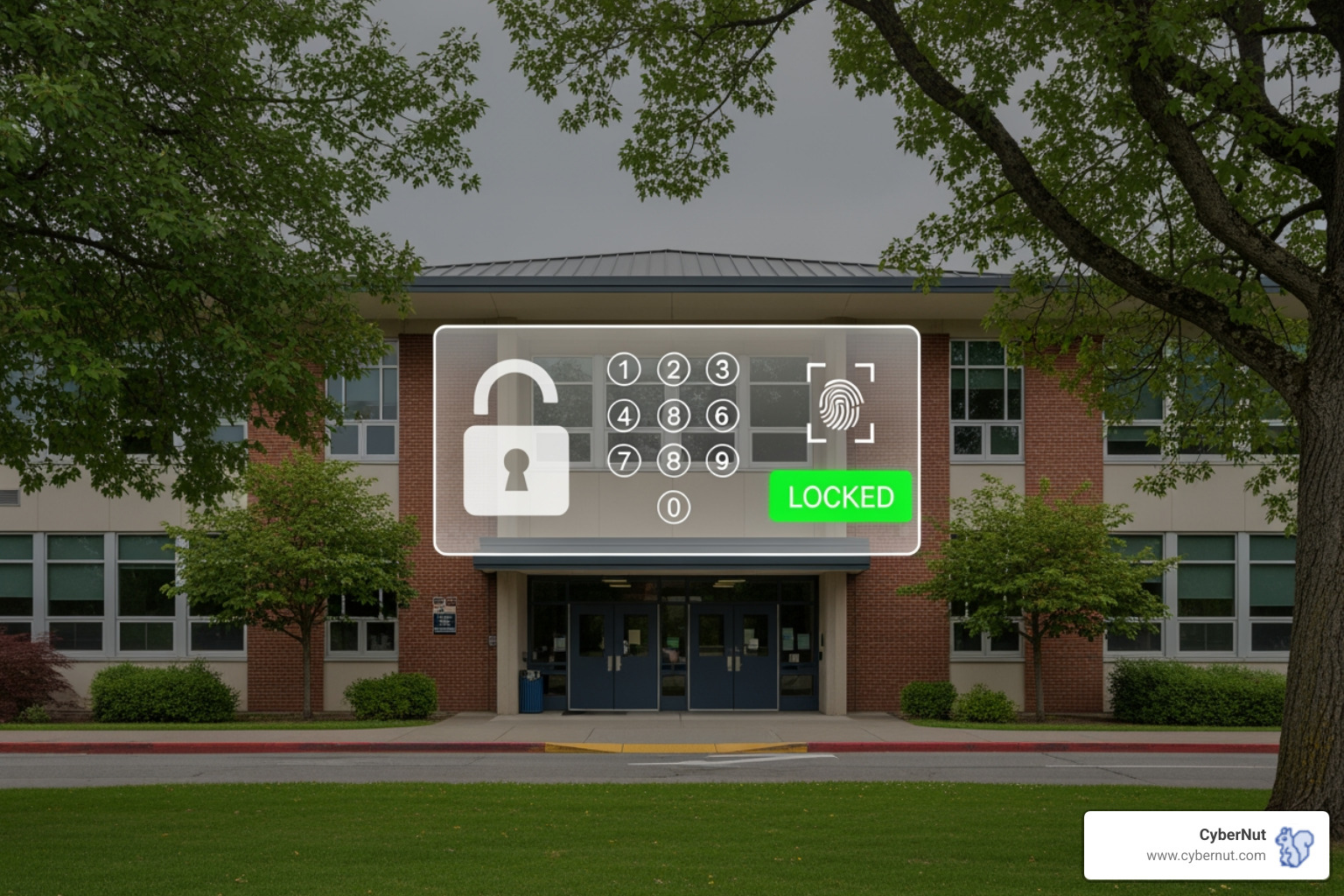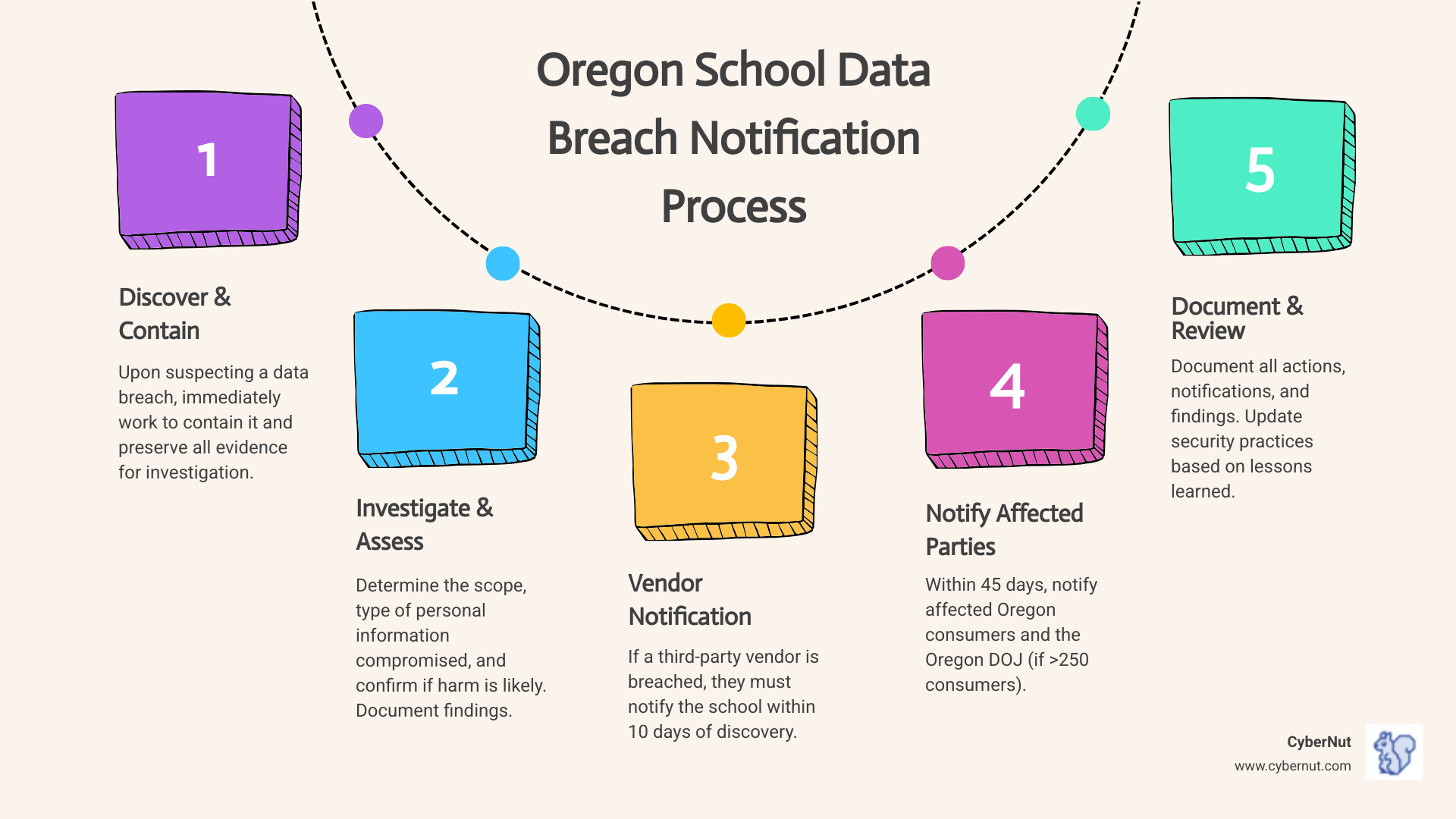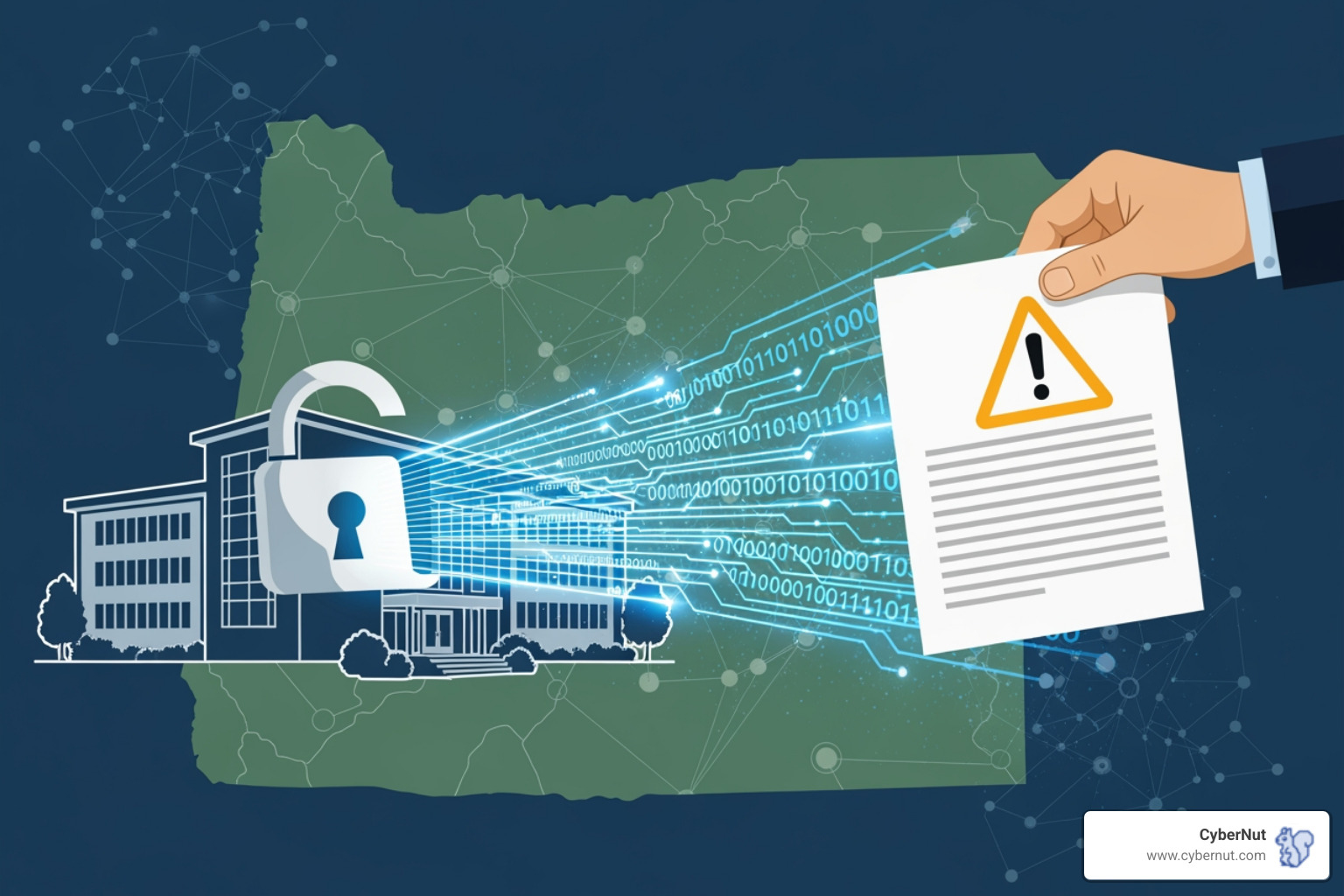
Oliver Page
Case study
November 4, 2025

Protecting student and staff data is a top priority for schools. When that data is compromised, Oregon's laws require swift action. This guide on All About Oregon’s Data Breach Notification Law for Schools will help K-12 administrators understand their responsibilities.
In short, Oregon schools must investigate any data breach and quickly notify affected individuals and state officials.
Here's a quick look at the core requirements:
The use of technology in Oregon schools for everything from lessons to lunch orders brings great opportunities but also serious privacy risks. Understanding state law is crucial for protecting your school community.
This guide covers everything from defining "personal information" to notification timelines and school-specific rules.

Related Reading:
The foundation of Oregon's data protection is the Oregon Consumer Information Protection Act (OCIPA). It's the rulebook for schools and other entities on handling data breaches.
First enacted in 2007 and updated in 2019, OCIPA aims to protect residents from identity theft by ensuring timely notification when personal information is compromised. This law sets clear responsibilities for K-12 schools handling student, staff, and parent data.
OCIPA exists to safeguard consumer information and ensure people find out quickly enough to protect themselves from fraud after a breach. It's about transparency and timely action.
OCIPA applies to any entity that handles personal information, and it explicitly covers public bodies. This includes Oregon's K-12 schools, school districts, and educational service districts. If your school handles personal information, OCIPA applies.
Knowing what qualifies as "personal information" is critical, as it triggers notification duties. This is a key part of All About Oregon's Data Breach Notification Law for Schools.
Under OCIPA, personal information is an Oregon resident's first name or initial and last name combined with one of the following unencrypted data elements: Social Security number, driver's license/state ID number, passport number, financial account numbers with access codes, biometric data for authentication, health insurance policy numbers, medical history, or a username with a password/security question for account access.
A name alone is not enough; it must be combined with a sensitive identifier to trigger OCIPA. For more on data classification, see our guide on Sensitive Data Definition and Types.
Understanding the penalties for non-compliance with OCIPA is crucial. The Oregon Department of Justice (DOJ) and the Department of Consumer and Business Services (DCBS) enforce OCIPA, reviewing breach reports for violations.
Failure to comply can lead to civil penalties of up to $1,000 per violation or up to $500,000 for a continuing violation.
OCIPA does not grant a private right of action, meaning individuals cannot directly sue schools for violations. They can, however, file complaints with the DOJ.
The best approach is prevention through strong cybersecurity and understanding your obligations. To assess your school's readiness against common threats, consider a Phishing Audit.

When a data breach occurs, OCIPA's clock starts ticking. This section outlines what you must do and when.
OCIPA defines a "breach of security" as the unauthorized acquisition of computerized data that materially compromises the security of personal information. This means access that puts the data at real risk. Understanding your school's Data Processing flow helps identify vulnerabilities.
The key timeline is 45 days from finding a breach to complete all required notifications.
These tight deadlines highlight the need for a pre-existing incident response plan to avoid missed deadlines.
Your notification must contain specific information to help individuals protect themselves:
OCIPA allows several notification methods:
Substitute notice is allowed if costs exceed $250,000, more than 350,000 consumers are affected, or you lack sufficient contact information. This requires posting on your school's website and notifying major statewide media.
The law allows for certain delays and exceptions to notification.
When you use third-party vendors, you do not offload your OCIPA responsibilities. If a vendor that handles your school's data finds a breach, they must notify you within 10 days.
Crucially, your school remains responsible for notifying affected individuals and the Oregon DOJ. The vendor's duty is to inform you; your duty is to inform your community. This makes strong vendor management and clear contractual notification clauses essential. Learn more in our guide to Third-Party Data Breaches 101.
Address vendor breach protocols before signing contracts. To assess your own vulnerabilities, consider a Phishing Audit.

Modern classrooms are highly digital, creating a complex web of data that schools must protect. Unlike businesses, schools handle a wide array of sensitive data, from student records to staff payroll. Understanding All About Oregon's Data Breach Notification Law for Schools means looking at how OCIPA intersects with other key laws.
Alongside OCIPA, the Oregon Student Information Protection Act (OSIPA) specifically governs student data. OSIPA's goal is to protect student data used by educational technology operators.
OSIPA prohibits ed-tech companies from selling student data and bans targeted advertising to students. It also requires them to use reasonable security measures and delete student data upon a school's request.
OCIPA and OSIPA work in tandem. OSIPA sets preventative data handling rules for ed-tech vendors, while OCIPA dictates the notification process after a breach occurs. Schools must consider both laws when a breach involves an ed-tech platform.
The Family Educational Rights and Privacy Act (FERPA) is another crucial federal law protecting Personally Identifiable Information (PII) in student education records. For a deep dive, see our guide: All About FERPA - The Federal Student Privacy Law That Still Matters in 2025. Official guidance is also available from the Family Educational Rights and Privacy Act (FERPA) page.
FERPA restricts access to student records and requires consent for sharing. While it lacks specific breach notification rules like OCIPA, its privacy principles are foundational to a school's data protection strategy. Strong FERPA compliance practices, such as access controls, often help meet OCIPA's "reasonable safeguards" requirement, creating layered protection for student data.
Schools manage a uniquely sensitive ecosystem of data, including:
The breadth of this data is staggering, and a breach of any type carries significant risk. Cybercriminals target schools for this data, often exploiting limited IT budgets. Understanding All About Oregon's Data Breach Notification Law for Schools is about protecting the community, not just compliance. Staff awareness is the first step toward a strong defense. To assess your vulnerability to common attacks like phishing, consider a Phishing Audit.

Knowledge of All About Oregon's Data Breach Notification Law for Schools is crucial, but proactive prevention is the key to protecting your school. Preventing breaches is about maintaining trust with parents, protecting staff, and ensuring a secure learning environment.
A strong prevention strategy begins with a risk assessment and a complete data inventory. Identify all personal information you collect, where it's stored, and who has access. This inventory is the backbone of your Data Security and Privacy Plan.
Even with strong prevention, breaches can occur. A solid incident response plan is what separates prepared schools from unprepared ones. Your plan should include:
Your staff can be your strongest defense or your weakest link. Human error, such as clicking phishing links or using weak passwords, is a leading cause of breaches. Effective training must cover phishing awareness, ransomware prevention, secure data handling, and password hygiene, including multi-factor authentication.
Training must be engaging and ongoing, not a once-a-year chore. Bite-sized, practical learning custom to schools is most effective. Learn more in our article on Cybersecurity Training Empowering K-12 Staff Against Cyber Threats.
Building a human firewall means empowering all staff to recognize and respond to threats, creating a culture of security. For more insights, see our guide on Cybersecurity for Educational Institutions. To identify security gaps and staff training needs, schedule a Phishing Audit.
Official resources can help you steer Oregon's data breach laws:
Use these resources to clarify your obligations under All About Oregon's Data Breach Notification Law for Schools.
Navigating data breach laws can be overwhelming. Here are answers to common questions about All About Oregon's Data Breach Notification Law for Schools:
Your first priority is containment. Immediately work to contain the breach by disconnecting affected systems or changing compromised passwords to prevent further damage. Simultaneously, preserve all evidence like logs and emails. This is crucial for the investigation and for proving compliance. Then, engage legal counsel and cybersecurity experts. They will help determine the breach's scope, what data was affected, and your obligations under OCIPA. An existing incident response plan is invaluable here.
Yes, if it contains unencrypted personal information of Oregon residents. This is a common and avoidable breach scenario. OCIPA exempts encrypted data from notification. If the data on a lost laptop is unencrypted, it constitutes a breach.
The only exception is if a thorough investigation concludes that harm is unlikely. This determination must be documented and kept for five years. Meeting this standard is difficult; encryption is a much safer strategy. This highlights why encryption is a critical, non-optional defense for all school devices.
Many schools mistakenly assume their cloud vendor is responsible for notification after a breach. This is incorrect. Under OCIPA, the vendor must notify the school within 10 days. However, the school, as the data owner, remains responsible for notifying affected individuals and the Oregon DOJ.
The law reflects the relationship of trust between your school and your community. Parents and staff entrusted their data to you, not the vendor. Strong vendor contracts with clear notification clauses are essential. For more, read our guide on Third-Party Data Breaches 101.
The bottom line: know your responsibilities and hold vendors accountable. To assess your school's vulnerability to common threats like phishing, schedule a Phishing Audit.
Navigating Oregon's data breach laws—including OCIPA, OSIPA, and FERPA—can seem complex. However, understanding these obligations is the first step toward building a security framework that protects your school community.
Proactive security is a fundamental responsibility. Meeting the trust your students and staff place in you means preventing threats, not just reacting to them. Technology alone isn't enough; your best defense is your people. Building a human firewall through continuous, engaging cybersecurity training is crucial for making your school resilient.
CyberNut was built to empower school staff. Our automated, gamified training transforms your staff from a potential vulnerability into your strongest security asset.
Don't wait for a breach to find your weaknesses. Schedule a Phishing Audit today to assess your school's real-world readiness. You can also explore our resources for more ways to strengthen your K-12 cybersecurity posture.
Your community is counting on you. With the right knowledge and training, you can protect their data with confidence.

Oliver Page

Some more Insigths


Back